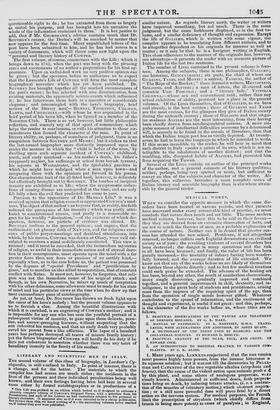LITERARY AND SCIENTIFIC MEN OF ITALY.
THE second volume' of this class of biography, in Lardner's Cy- clopedia, is still confined to Italy. In point of interest, there is a change, and for the better. The materials to which the compiler has had access are much richer; the incidents in the lives of the persons and their individual peculiarities being well known, and their own feelings having been laid bare in several cases either by formal autobiographies or in productions of a
• This Life was prefixed to an edition which looked as if designed to embrace a olembly complete edition of COWPER'S Original Poems, with a selection from his Translations and such of his Letters as had immediate relation to his personal or literary character. It appeared also as if it were intended to be a cheap publication. But further than thisose know nothing of it : the succeeding volumes never reached us, if indeed they ever were published,
similar nature. As regards literary merit, the writer or writers have improved something, but not much. There is the same judgment, but the same feebleness displayed, as in the first vo- lume, and a similar deficiency of thought and expression. Except the life of GALILEO, which is written with some vigour, the compiler appears to be translating from different authors, and to be altogether dependent on his originals for manner as well as matter ; or it may be that he is a foreigner writing in English. This close adherence to the manner of the originals has, however. one advantage—it presents the reader with an accurate picture of Italian life for the last two centuries. The number of Lives contained in the present volume is four- teen. Among the subjects, there is one philosopher, GA LI LEO; one historian, GUICCIARDINI ; six poets, the chief of whom are GUARINI, TAsso, and MONTI ; a satirist, TASSONI, the author of "The Rape of the Bucket ; " three dramatic writers, MET ASTASIO, GOLDONI, and ALFIERI; a man of letters, the ill-starred and eccentric UGO POSCOLO ; and a " literary lady," VITTORIA COLONNA,—whose sex and conventional rank, rather than any actual exhibition of ability, procured her a place in the present volumes. Of the Lives themselves, that of GA I. I LEO, as we have said already, is the best written ; those of GUARINI and TAsso are the most curious, for the glimpses they give of Italian society during the sixteenth century ; those of GOLDONI and that singu- lar madman ALFIERI are the most interesting, from their having been chiefly drawn from autobiographical sources. A more sin- gular account of intellectual difficulties overcome by a determined will, is scarcely to be found in the annals of literature, than that which the Italian tragic poet has so vividly depicted. At twenty- seven he had to learn the language in which he intended to write. If this seems incredible to the reader, be will bear in mind that each district in Italy speaks a patois of its own, which is not in- telligible to the inhabitants of another district ; and that the rambling, idle, dissipated habits of ALFIERI, had prevented him from acquiring the Tuscan.
Several of the Lives contain an outline of the principal works of the author, and a general estimate of his literary qualities ; neither, perhaps, being very spirited or acute, but sufficient to convey an idea of the subjects and character of the writer. Al- together, this collection furnishes a more complete series of Italian literary and scientific biography than is elsewhere attain- able by the general reader.


























 Previous page
Previous page